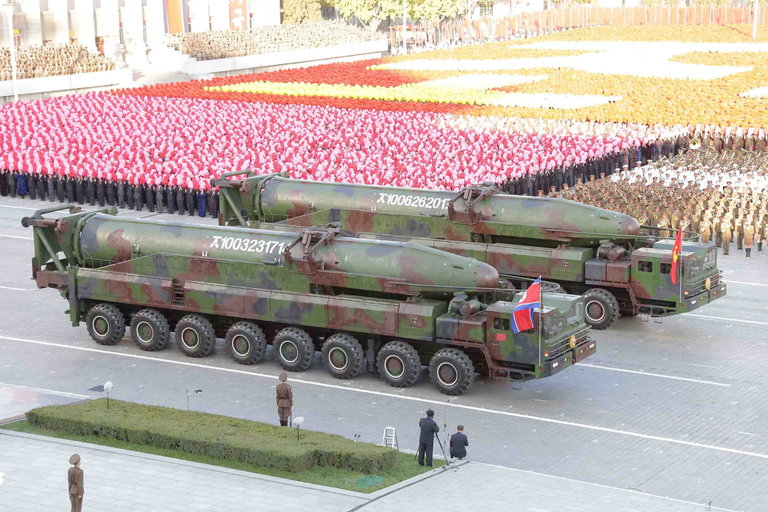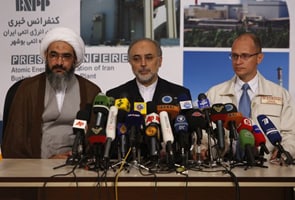Japan is taking defensive measures:
The Yomiuri ShimbunThe government is considering equipping planned ground-based Aegis Ashore systems with the capacity to intercept cruise missiles, in addition to the ability to defend against ballistic missiles.
With Chinese bombers making repeated flights in areas around Japan, the government believes it should also prepare for attacks by cruise missiles, multiple government sources said.
The government intends to introduce two Aegis Ashore systems in Japan by around fiscal 2023 as part of the effort to boost the nation’s missile defenses.
These would be equipped with SM-3 Block IIA missiles, a new interceptor being jointly developed by Japan and the United States with the capacity to intercept ballistic missiles at altitudes exceeding 1,000 kilometers.
The government is also considering equipping the systems with SM-6 anti-air missiles, which are multifunction interceptors that also can take down cruise missiles.
United Nations (AP) — North Korea’s deputy U.N. ambassador said Tuesday the country plans to launch many more satellites and accused the United States of trying to block its efforts to help peacefully develop outer space.
Kim In Ryong told a U.N. General Assembly committee meeting on “International Cooperation in the Peaceful Uses of Outer Space” that the country’s five-year plan for 2016-2020 includes development of “practical satellites that can contribute to the economic development and improvement of the people’s living.”
As a party to several space treaties, North Korea’s space development activities are “all ground on legal basis in all aspects,” Kim said.
But he said the United States is “going frantic to illegalize our development of outer space,” claiming the effort violates U.N. sanctions.
“The U.S. is the country that launched the largest number of satellites and yet it claims that our launch of satellites is a threat to international peace and security,” Kim said. “This is a preposterous allegation and extreme double standards.”
The United Nations, the U.S. and other countries view the North’s space launch development project as a cover for tests of missile technology, as ballistic missiles and rockets in satellite launches share similar bodies, engines and other technology. North Korea is also openly working on developing nuclear-armed missiles capable of striking the U.S. mainland.
US: North Korea Months Away From Being Able to Hit US with Nuclear Missile
North Korea is likely just months away from being capable of striking the United States with a nuclear missile, according to two top U.S. officials.
CIA Director Mike Pompeo told a forum in Washington on Thursday he is “deeply worried” about the advancing threat from North Korea and the possibility it could spark a nuclear arms race across East Asia.
“We ought to behave as if we are on the cusp of them achieving that objective,” Pompeo said when asked about Pyongyang’s pursuit of missile technology that could launch a warhead to targets in the U.S.
“They are so far along in that it’s now a matter of thinking about how do you stop the final step?” he added.
McMaster: We’re running out of time
U.S. National Security Adviser, Gen. H.R. McMaster said later on Thursday that Washington was racing to resolve the situation, short of using military force.
“We’re not out of time but we’re running out of time,” McMaster said, speaking at the same event. “Accept and deter is unacceptable.”
The comments by Pompeo and McMaster come as tensions between the U.S. and North Korea have been steadily rising following Pyongyang’s latest nuclear test last month, it’s sixth overall, and repeated tests of what intelligence officials have assessed to be both intermediate and long range ballistic missiles.
But despite warning that North Korea is just months away from being able to target the U.S., the CIA’s Pompeo cautioned there are still questions about just how “robust” the North Korea nuclear threat has become, and whether Pyongyang will be able to deliver multiple nuclear warheads to nuclear targets.
“There’s always a risk. Intelligence is imperfect,” Pompeo said, adding there is evidence Pyongyang may be getting help from Iran, citing “deep conventional weapons ties as between the two countries.”
He also warned that each North Korean test makes an arms race ever more likely.
“You watch as North Korea grows ever closer to having its capability perfected, you can imagine others in the region also thinking that they well may need that capability,” he said.
Putin suggests force won’t work against North Korea
On Thursday, Russian President Vladimir Putin warned against the use of force to eliminate the North Korean nuclear threat, suggesting it would not work.
“Talks about a preventative, disarming strike — and we hear both hints and open threats — this is very dangerous,” Putin said during a speaking engagement in Sochi.
“Who knows what and where is hidden in North Korea? And whether all of it can be destroyed with one strike, I doubt it,” he said. “I’m almost sure it is impossible.”
North Korean officials have also repeatedly warned the U.S. against any provocations.
Pyongyang’s deputy envoy to the United Nations, Kim In Ryong, warned Monday that war could break out at any moment.
Other North Korean officials have accused the U.S. of making preparations for war, citing the presence of the USS Ronald Reagan, a nuclear-powered aircraft carrier, conducting exercises to the east of the Korean Peninsula.







